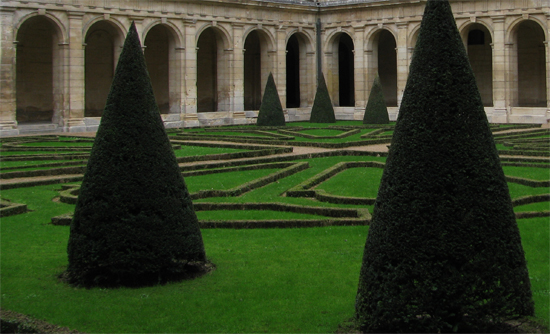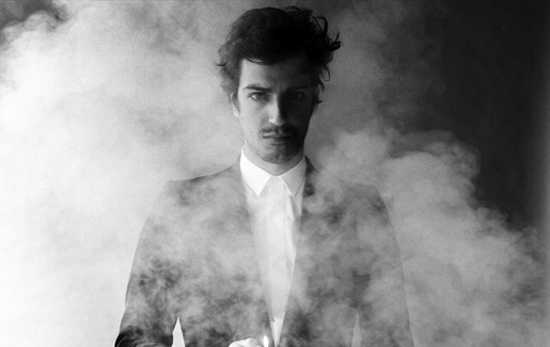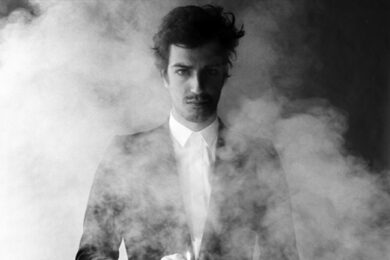Nördik Impakt, which ran from 29th October until 2nd November, sounds like it should be a Scandinavian festival. Actually, it’s been held in Caen – not to be confused with Cannes – in Normandy for the past 15 years. In that time, it’s become one of France’s key ‘electro’ – which is the French catch-all for electronic music rather than a particular genre description – events. It’s a predominantly French line-up too, although in 2011 the biggest draws included Aphex Twin and Benga. It’s not really entirely ‘electro’ either, with space found for indie-rock, pop, folk and even a solo piano set from Christophe that I arrive a day late for, sadly.
There are a few things I knew about Caen before I came here. Firstly (as I like to keep informed about this kind of thing) is that the local dish is tripe – Tripes à la mode de Caen in fact, generally cooked in calvados, another speciality. I tried some and enjoyed it, but you’re unlikely to be converted if not sold on the idea of something that has to be bleached before you can cook it. Certainly, plenty of people born and raised here have very reasonably foregone the pleasure; it’s not as though London’s citizens are constantly gorging themselves on jellied eels. More palatably, the village of Camembert is also not far down the road.
Caen also became one of the most important cities in the Duchy of Normandy under William the Bastard – later William the Conqueror – who built two abbeys there, one for women and one for men. This is apparently what it took to placate Pope Leo IX after William had gone against his wishes and married his own cousin. Just to be on the safe side, the abbeys are pretty far apart, although a gentleman who came to my aid with directions as I was struggling with a city map, possibly looking as though I was trying to wear it, suggested that a secret tunnel had been built at some stage connecting the two. Cheeky monks! (Or: where there’s a Will, there’s a way.) Some time later, in 1944, Caen was subjected to a bombing campaign that leveled more than two thirds of the city, so much of what you can see today is 1950s built, although the abbeys and a castle survive.
A friend also informs me that a best-selling local philosopher, Michel Onfray, is a forthright proponent of hedonistic values. In some way, I think it’s fair to say that in this he’s at one with the young people of Caen, at least in their enthusiasm for the hardtek DJs playing through Thursday night into Friday morning. This sight in particular is quite gratifying as, without any particular evidence, I’d always imagined this kind of music thriving out in the ‘regions’, away from the whims of Paris fashion.
On the Friday night, when the festival splinters into ten or so smallish, and mostly free, bar-based happenings, the two principal genres offered are hard techno and dubstep. This is the evening when I choose to alight in a bar called L’Orient Express, a large and rather tranquil American-style billiard hall boasting a surprising selection of quality beers and a red-curtained area from behind which the sounds of the evenings’s musical offerings emanate. Some of this is courtesy of local student DJs, churning their way through EDM remixes of Smells Like Teen Spirit and the like while indifferent clients ponder the next tricky shot, but there are also a couple of live shows – first, there’s half-French, half-Luxembourgois electronic duo Binary & Dyslexic. They’ve yet to release anything together but this, only their third live show, is live and on-the-fly layering of ambient washes, dubby techno, acid squelches and more. (It’s worth checking out the French half of the duo, Christophe Biache’s Metz-based label Chez Kito Kat, including his own very dub techno-leaning Mr Bios project). Their sound is only hampered by the typically low French sound levels – much less call for earplugs over here.
Next up are Youp Horn. You may need to read that name out loud a couple of times. Youp Horn are a Caen-based dubstep duo, operating rather conventionally at the brostep end of the scale except for the fact that one of them is thrashing all hell out of a drumkit. On one level it’s pretty daffy but I’d genuinely be interested in feedback on how much ‘live dubstep’ is going on in the UK – Muse (!) or Mala In Cuba excepted. I remember being handed a CD three or four years ago by a French dubstep ‘group’ and being surprised to find that it was indeed a live band, again with the beats being played by a live drummer. Where exactly the origins of France’s roots reggae culture lie I’m not 100% sure – it’s tempting to say Serge Gainsbourg set the ball rolling with his Sly and Robbie-assisted albums Aux Armes Et Caetera and Mauvaises Nouvelles Des Étoiles, but maybe that’s too much of a ‘great man’ view of its history over here. But Bob Marley is certainly worshipped over here as much, if not more so, than in the UK (want to make friend with only an acoustic guitar at your disposal? Play ‘No Woman, No Cry’) and reggae is still an option for a mainstream artist in France. There are also thriving electro-dub scenes such as that in Lyon, based around the Jarring Effects label. Which is all to say that in France I get the feeling that dubstep rhythms were at some point assimilated into roots reggae/live dub set ups as another musical option alongside more traditional styles.
Watching Youp Horn (who apparently are more influenced by the DJ + drummer set up of Travis Barker and DJ AM) it also occurs to me that dubstep-inspired drumming (as opposed to drum & bass-inspired drumming, which can end up sounding prissy) gives access to a mode of heaviness that is very distinct from rock and metal. When I ask the DJ of the pair, DT TF, about it afterwards, he offers a more prosaic reason for the live drumming. "I think as long as you’re making people dance anything’s fine but in France, to get booked for a live show, you’ve got to have some real playing. Otherwise it’s looked down on."
That gripe aside, developing artists in France have the kind of support that is undreamed of on this country. Nördik Impakt is centred around the Cargö venue, which has the status of a SMAC (Scène de musiques actuelles – usually a venue or a groups of venues that receive public money to support ‘contemporary music’). The function of a SMAC is not only to provide a venue for bands to play, but also support local acts and engage with the community (working with schools to offer workshops and giving local students experience of organising their own event, as an example.) The precise nature of the support for artists can vary but generally a few are chosen for a pre-established period (a year or two) and then can have access to free rehearsal rooms – in Caen, as with other SMACs I’ve heard about, these can be accessed via swipe card 24 hours a day – artistic guidance, aid with touring, finding a label and distribution. (Curiously, many people I spoke to at the festival seemed to be under the mistaken impression that, in the absence of these state-driven projects, the UK was some kind of paradise for private investment where various brands spray cash at aspiring new talents.)
In the past, Cargö has been involved with acts like Concrete Knives, Granville and Clockwork Of The Moon. In a Magic Mirror venue (portable, wooden fairground-style art nouveau ‘tents’ that are hired from Belgium and erected on the sites of various festivals), I catch one such band – essentially the solo projects of Liverpool-born Lewis Evans, who also sings with the far punkier The Lanskies. Aided by various local luminaries, including a member of Concrete Knives and Céline Cipolat, one of Pete Doherty’s dancers (this was news to me but then I haven’t really followed Doherty’s career with that much interest), he croons his way through a set of determinedly music-hall UK indie and endears with his announcement that he is rather nervous despite having previously "played in 10 million Chinese people."

On Saturday in the largest temporary venue, the Chapiteau, there’s another local boy, Fakear who, without approaching AraabMuzik (who’s at the festival too) levels of finger gymnastics, does a neat line in crisp, tidy rhythms and MPC triggered samples, usually wordless female diva (or a male pitched upwards I suppose) vocal snippets and patchworks of lush acoustic instrumentation (guitar, harp, kalimba). He’s found his sound and for the time being he’s damn well clinging to it, but over short spells – give or take the overly perky whistling on ‘Kids’ – it’s sufficiently tangy. Saturday is largely when the bigger names play, so we get Woodkid’s blockbuster pomp, Brodinski, Jackson and His Computer Band and (my highlight) Gesaffelstein. Chateau Marmont also feature in the smaller Fermeture Éclair venue. I wasn’t too keen on the Phoenix-y soft rock turn they took on this year’s The Maze album but here, particularly for the instrumentals, they’re a cosmic disco delight, finding grooves that wouldn’t have been out of place on the recent Cosmic Machine compilation of 70s French electronic tracks.
I like Jackson and a lot of the tracks on his recent Glow album, for their goofiness and weird, plasticky translucence. The stage set, with its curved consoles and Jackson waving a dismembered Terminator arm though the air to provoke shimmering metallic sounds, looks great. But as opposed to the recordings, where the rapid chop ‘n’ change and stylistic pile-ups are part of the fun, live it can struggle to get going. Ideas on top of ideas are presented momentarily only to be whipped away hurriedly. It’s like having a series of dessert trolleys stop in front of you only to roll away too quickly for you to take your pick of something, let alone taste one of the exquisite-looking confections. The thumping ‘Arp #1’ and ‘Pump’ do the business nevertheless, in spite of the frustration.
No such problem with Gesaffelstein. Barring the odd contemplative interlude, his set is bracing in its metallic assertiveness, all rust-red girders and bolt-pistol beats, expertly paced. How is something with this kind of industrial techno sensibility (and not just – there are flashes back to old school rave, while ‘Pursuit’ opens like peak DAF) reaching a wider audience? It’s not just down to Kanye West’s patronage. The trick is, I think, in the ‘song’ dynamics – as anyone from The Prodigy to Justice have proved, you can get people accepting some pretty uncompromising sounds if you parcel out the hooks and the drops judiciously.
Now comes the difficult bit, one more show I haven’t mentioned yet. Across town from L’Orient Express on the Friday night, FAUVE ≠ played a sold-out show in a church. I’d just caught them in London the week before and witnessed the rapturous reception of the French audience members. They’re the most talked about young band of the moment in France and that has translated into many other sold-out gigs and a six-date run at the 1,500 capacity Bataclan in Paris in February next year.
FAUVE ≠ are a hip-hop-inspired indie group (the lyrics are spoken, or ‘rapped’), who describe themselves as an open ‘collective’ rather than a band and include a film maker – the whole collective, and their own label, is referred to as Fauve Corp, where I take it the ‘Corp’ is more about the whole being more important than the sum of the parts than a BEF/Heaven 17-style entryist strategy. They’re refusing to sign to a label, don’t like themselves being filmed or photographed, and they’ve got a vague manifesto about not giving in to hate and shame, valuing honest human interaction and love. Nothing too difficult to agree with there yet nothing to really hang on to either. So far, so Wu Lyf – except it’s clearly proving to be much more popular than that. One French site went so far as to describe the song ‘Sainte Anne’ as a "modern French equivalent of Grandmaster Flash’s ‘The Message’" (in the process completely missing ‘The Message’s message) although I have come across the odd dissenting voice, one of those being Abigail Ainouz of Les Inrockuptibles in her review of the London show at the OohlaLA! festival, who felt that some people might fail to identify with this vision of a "génération sacrifiée", these angsty unsatisfied, twentysomethings. But clearly a lot of people are identifying with it.
There’s no doubt that twentysomethings have plenty of reasons to feel aggrieved when surveying the world they have been bequeathed. FAUVE ≠ are speaking for a particular socio-economic segment of that generation. Over mournful piano, ‘Sainte Anne’ begins with an admission/conceit that the ‘speaker’ is finding it difficult to organise their thoughts "at the moment". The voice soft, low, almost whispered, as if this person is taking the listener into their confidence.
Then (and I’m presenting this in a slightly abridged form): "I was born into a family of comfortable means, I’ve always been privileged, I’ve never lacked for love or anything else even if my mother, who comes from a more working class background, was sometimes a little hard on me and my brothers. At school I was a good student, at home I was polite… today I know that my route through life has been more or less laid out… I’ve a wife and beautiful children, credit to pay off… but you see it’s been six months that I’ve barely been able to sleep, I didn’t eat for two days without even really noticing and when I look in the mirror I see a strange guy, pale, translucent… Doctor, you need to do something for me, take a hammer and smash my fingers, because I can’t carry on like this…"
He does continue though, describing the banality of work, a tube that smells of piss and death (actually, I find that certain lines of the Paris metro often smell more like rotten eggs, but fine), banal chatter amongst friends.
This is going to be enough evidence for the prosecution in some people’s eyes, and I must admit it did bring to mind a 2002 track from French rappers TTC, ‘De Pauvres Riches’ (Poor Rich Kids’) – "Her little brother’s been an MC since he drank 8.6 [the strong Dutch lager, I presume]… he fantasises about having worries…being poor is so chic."
FAUVE ≠ would perhaps argue that they’re following the hip-hop credo, writing about what they know, being real. And there’s nothing wrong with pointing out that being able to get the ‘right’ qualifications’ and a ‘good’ job (getting ahead, doing the right thing, as David Cameron would have us all do) isn’t exactly a panacea for all human ills. But often it’s hard to know what FAUVE ≠ are so anxiously railing against. In ‘Blizzard’, a song which would seem to be set in the aftermath of a couple’s argument, the lyrics take "shame" to task (actually threatening to attack it on its way home), offer to send "sadness" packing and express defiance in the face of death. These three (which together comprise the "blizzard") are posited as the enemies of positivity. Negativity abounds, but try keep your spirits up – ‘Haut Les Coeurs’, as another of their songs urges. But where does the shame come from? Might there be a justification for the sadness? What are you getting your spirits up for? None of this is clear. (And hey, maybe after all it was just a stupid spat blown out of proportion rather than an ‘O, death where is thy sting!’ moment.)
I realise that FAUVE ≠ have put themselves into a position of receiving more criticism than the average group precisely because they’ve stuck their collective neck out. I don’t expect them to have all the answers as if I’m Paxo goading Russell Brand. The real problem is that, in spite of their exhortations, FAUVE ≠’s realism or honesty seems to preclude much actual vitality, any life force that might galvanise the body or the imagination. They’ve taken the idea of the ‘real’ in rap too literally and missed the wit and the wordplay, the surreal juxtapositions, the fact that it’s often larger than life. On record, the music seems drab and the voice, meanwhile, comes across as petulant, full of an adolescent sense of victimhood that it is unable to identify or thematise as such (as Morrissey was once able to do).
But clearly they’re responding to a desire for a group that ‘means’ something – however elusive that meaning is; that you can pin your colours to. But I think any meaning there isn’t really about the specific stresses of life in late capitalist society. What FAUVE ≠ are voicing is the longer-established and generalised sense of dissatisfaction – and ultimate optimism – proper to young middle-class people.
But guess what? Some of that vitality I find missing in the recordings is right there on the stage. I even found myself thinking ‘hey, that guy can actually rap’. Was I caught up with the emotion of the crowd, and the fresh-faced enthusiasm of the band themselves? Are they just that hardy perennial, a group that’s much better live than on record? Might I have underestimated FAUVE ≠? I’ll be keeping half an eye on them from now on, anyway.
For more from Rockfort, you can visit the official site here and follow them on Twitter. To get in touch, email info@rockfort.info.



